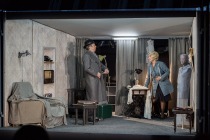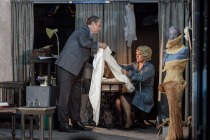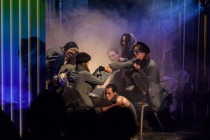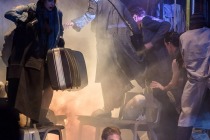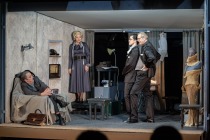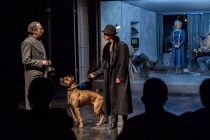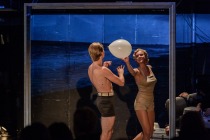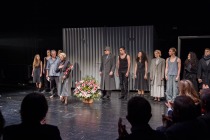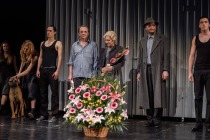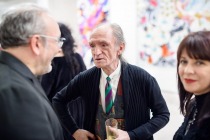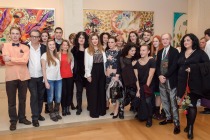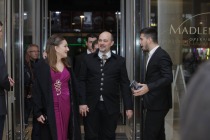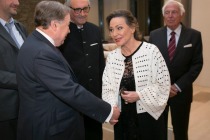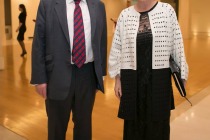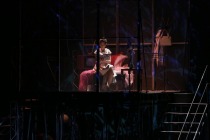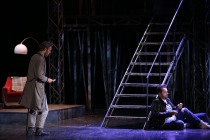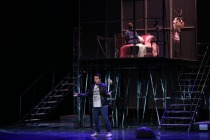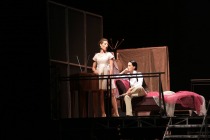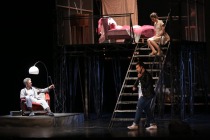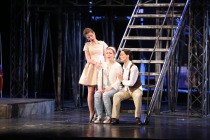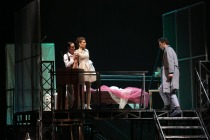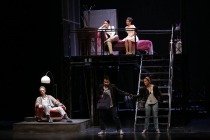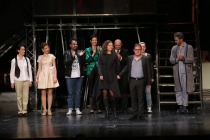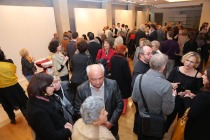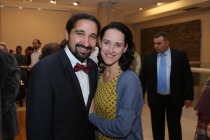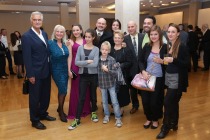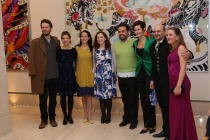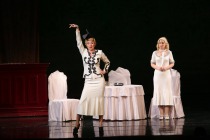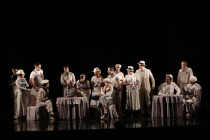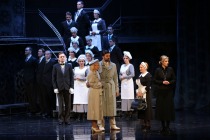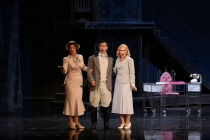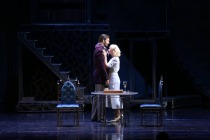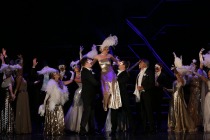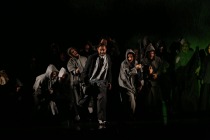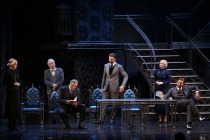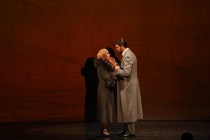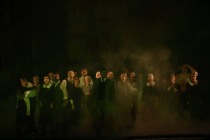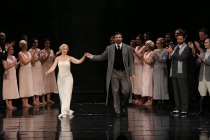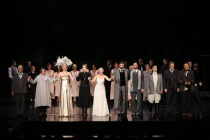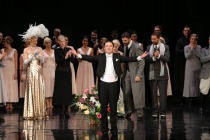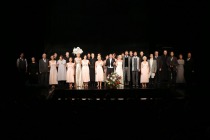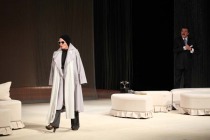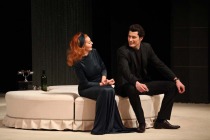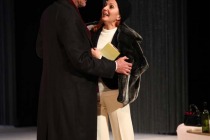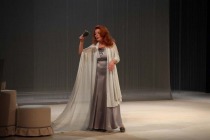fotografije sa premijere
barokne opere ORLANDO
VELIKI GETSBI
Rezervacije i kupovina ulaznicaVELIKI GETSBI Hrista Bojčeva
22. april u 18h
Čarobna frula sa popustom!
MOCART ZA DECU – opera “Čarobna frula” u Madlenianumu
Opera Čarobna frula, urađena kao bajka prilagođena deci, svakako bi najmlađima mogla da pruži nadasve drugačiji i zabavan način slušanja Mocarta i gledanja pozorišne predstave.
Poznato je da se u stvaranju predstava za decu opravdano pribegava korišćenju muzike u što intenzivnijoj meri, jer muzika nalazi put ka srcu čak i kad dete ne razume tekstualni deo predstave i sadržaj priče.
Čarobna frula predstvlja nesumnjivo muzičko remek-delo koje neminovno dopire do srca najmlađih, te će i ona deca koja operu još nisu gledala, posredstvom Mocartovog muzičkog genija, neosetno primiti u srce tu umetnost.
Sadržaj dela ima nekoliko „priča u priči“, a u svojoj suštini je fantastičan, bajkovit i predstavlja sukob dobra i zla. Dva sveta, podzemni svet mraka predstavlja zla Kraljica noći, a svet svetlosti, pravde i dobrote Sarastro. Zla Kraljica noći želi da se domogne čarobne frule koja ima magičnu moć i želi da njome pokori svet. Čarobna frula za mnoge je simbol snage same muzike i muzičke umetnosti. Medjutim, svet zla i tame propada, a svetlost nadvladava i magična moć čarobne frule se koristi na radost i za sreću svih.
Cena karte: 420 dinara.
fotografije sa prve predstave u ovoj sezoni
mjuzikl REBEKA!
5. oktobar 2015. 19:30 časova
Velika scena Madlenianuma
Tajna Grete Garbo 13.10.
popust 50%
Prvi put u ovoj sezoni melodrama TAJNA GRETE GARBO!
52. izvođenje
Velika scena Madlenianuma
Utorak, 13. oktobar u 19:30!
Cena karte: 500 din!
S. Milovanović, I. Vujić, M. Latinović
MILOŠ CRNJANSKI
Since its setting up, the Opera and Theatre “Madlenianum” has been cherishing the repertoire that is thematically marked by lives and deeds of great historical figures of the world of art and science. The newest drama premiere (7th November, on the Large stage of “Madlenianum” with the audience at the stage) is to deal with the life of Milos Crnjanski, who undoubtedly belongs to the small number of writers that are in the very top of Serbian literature. The works created by his completely authentic talent in the area of novels, poetry, drama and essays have only be confirmed by time as real masterpieces and thus theatre play about this literature genius is the mission of the national significance.
We find Milos Crnjanski, already remarkable Serbian (and Yugoslav) writer, in his young age, at the beginning of drama, being together with his wife Vida in London where he lives during and after the Second World War in exile. “A Novel about London” of Crnjanski is the basis out of which weaves the entire play, since Slavenka Milovanovic, Ivan Vujic and Milos Latinovic have, as the authors, wisely used the fact that “A Novel about London” is in its large part an autobiographical story of our great writer. The gloomy moments, in which two great intellectuals, Milos and Vida, change their diplomatic life for the life in which they are hardly able to feed themselves, are certainly distressing. But even more distressing is their exile in the picture of the political events. Homeland rejects them, foreigners do not accept them, and both former and new Yugoslav governments condemn them as they do not want to express their affiliation either to one or another. Married couple Crnjanski belongs only to each other and out of that fact originate all poeticism and the strength of dramatic text. In hard times, Milos and Vida were saved by their love. In drama, Milos says that his wife’s faith in his creative work was the crucial issue for him to continue writing in his hardest life period. What a pity it would have been for Serbia if that had not happened!
From the position of people of mature age, who have defended their marriage and dignity despite all attacks, Milos and Vida recall their youth (here the writer involves young Milos and young Vida as new characters) and literature beginnings of Crnjanski. On the one hand, the audience will see romantic moments of their meeting and travels, but on the other hand the actors will remind them of that how alone Crnjanski was and misunderstood by critics and colleagues when it came to his works. Readers adored him, but public recognitions did rarely arrive.
The play ends with a distressful return of Milos and Vida to their beloved country, to Belgrade, throughout many aggravating circumstances, almost in illegality. Milos came to his homeland to say goodbye to earthly life.
What we could not imagine a drama play about Milos Crnjanski (and his Vida) are numerous quotations from his poetry and prose. Those quotations will make the play become one poetic fresco dedicated to the literature great man who deserves all honors of the nation he created for, he suffered with, he write about. The play has the aim to be strong and unusual, as those two people it talks about are.
The ply “Milos Crnjanski” is done in coproduction with “Bitef Theatre”. A director’s baton is in the hands of Ivana Vujic. The author of the scenography is Kosta Bunusevac, and Svetlana Volic deals with costumes and video activities. Music for the play is composed by Irena Popovic, whereas Isidora Stanisic is a choreographer.
The audience will be able to see Tanasije Uzunovic in a title role and Danica Maksimovic as Vida Crnjanski. Cast also consists of Nebojsa Kundacina, Tihomir Stanic, Joakim Tasic, Milena Radulovic, Anja Orelj, Jelena Graovac, Mia Simonovic, Nikola Zivanovic and Dusan Vukasinovic. In the play will also perform dancers of Bitef Dance Company, Luka Mihovilovic, Ana Ignjatovic Zagorac, Natasa Gvozdenovic i Luka Cubrilo.
V. Nabokov
LOLITA
The magic that follows the word Lolita, meaning the mixture of the innocence and eroticism, has not been fading since the occurrence of the novel “Lolita” by Vladimir Nabokov, published in 1955. The novel of the great Russian-American writer is considered to be one of the most controversial books of the twentieth century. The puritanical attitudes have very often disputed the novel, but the top literary critics, despite its controversial theme, have never denied the high literary achievement of Nabokov’s “Lolita”.
All over the world, through the film, drama, ballet, there have been various versions about a thirty-eight Literature Professor, Humbert Humbert, who falls in love with a twelve year old Dolores Haze, nicknamed Lolita (nymphet). Lolita is a daughter of Humbert’s landlady at whom he hires a room. He rationally defines his infatuation with her as awakening the memory on his first love from his boyhood, Annabel, who died of typhoid fever. When the landlady Charlotte dies, considering that Humbert has married her, he takes custody of Lolita with whom he embarks a kind of road trip across America.
A talented team of the young theatre artists is preparing for the small stage of „Madlenianum“ their view of this love story which is becoming even more intriguing at the present moment when the questions of human rights are examined anew. The play director, Jovana Tomic, finds the new approaches and new interpretations of Nabokov’s controversial love story in these modern times where even the timing of the puberty age is changing, as well as the ways of communication among generations. The first associates of Jovana Tomic are a playwright, Dimitrije Kokanov, a costume designer, Darinka Mihajlovic and a choreographer, Maja Kalafatic. The team of actors is led by Bojan Zirovic, in the role of Humbert and the audience will watch young Ana Mandic in the title role. Other roles are assigned to Irma Milovic and Pedja Marjanovic.
The project “Lolita” has been chosen in the Competition of “Madlenianum” that was intended for young theatre artists and supported by the Ministry of Culture of the Republic of Serbia as one of the significant plays of young authors in 2015. The premiere of “Lolita” is planned for 14th November. “Madlenianum” is a theatre ready for provocation which the young authors have offered in their idea to prepare Nabokov’s work on the stage and we are sure that Belgrade theatre audience is also ready for that event!
Krunislav Simić
BLOOD WEDDING - BOLERO
Manuel de Falla, Joaquin Rodrigo, Maurice Ravel
Ballet in two acts
Direction, choreography, set design and music selection: Krunislav Simic
Costume Designer: Ruzica Ristic, Lighting Designer: Srdjan Jovanovic, Repetiteur and Assistant Choreographer: Gordana Simic
Blood Wedding
Leonardo ...................... Jovan Veselinovic
Bride ............................ Ana Pavlovic
Bridegroom ................... Igor Pastor
Leonardo’s Mother ........ Nada Stamatovic
Leonardo’s Wife ............ Ada Raspor
Gipsy Woman - narrator ...... Milan Rus
Ballet Ensemble: Jovica Begojev, Raffaelo Diligente, Bernardo Badano, Nicola Bianco, Milos Marjan,Tijana Sebez, Jovana Nestorovska, Dejana Zlatanovski, Jovanka Zaric
Bolero
Girl .............. Gordana Simic
Young Man ................. Milan Rus
Ballet Ensemble: Jovica Begojev, Raffaelo Diligente, Bernardo Badano, Nicola Bianco, Milos Marjan,Tijana Sebez, Jovana Nestorovska, Dejana Zlatanovski, Jovanka Zaric, Nada Stamatović, Ada Raspor
Blood Wedding drama by F.G. Lorca has inspired the choreographer Krunislav Simic who heard the music, sensed the movement, the storm of passion and whirl of emotions in it.
In the characters of Lorca’s drama, deeply conflicting and contrasted, appear the motifs and elements which are the moon and the death, as the symbols of destiny.
A woman and woman’s soul are main and touching elements of drama and ballet dancing that winnows onto the music of the greatest Spanish composers and those inspired by Spanish folklore (Joaquin Rodrigo, De Falla, Ravel).
In Bolero, Ravel’s famous work, orgiastic and sensual, the passion slowly takes virgin’s areas growing thus to its culmination in the powerful and passion charged areas of human sexuality.
The cosmos and cosmic, eternal and human, unlimited domains of erotic are just the foundation of the passionate game and dancing. The Spanish gypsies, a beautiful gypsy, glint of knives in the moonlight, love, jealousy, suffering and longing are just the frame of the exciting events expressed by the human body, action and dance, creating the ballet-dramatic prose of a high charge.
GEORGE FRIDERIC HANDEL
ORLANDO
Serbian premiere New Belgrade Opera and Opera and Theatre Madlenianum
OPERA IN THREE ACTS (1733)
MUSIC: GEORGE FRIDERIC HANDEL (1685–1759)
LIBRETTO: CARLO SIGISMONDO CAPECE
Predrag Gosta, arts manager, conductor, cembalo
Marijana Mijanovic, artistic advisor and vocal pedagogue
Alvaro Schoeck, director
Michaela Müller, animator
Merle Fahrholz, dramaturgist
Sanja Mimic, costume designer
Tijana Trailovic and Tamara Brankovic, set design
Nevena Djordjevic, project manager
Vesna Curcic Petrovic, stage manager
Dragana Andjelic Bunjac, repetiteur
ROLES:
Orlando – Bojan Bulatovic (Serbia), countertenor
Zaroastro – Sreten Manojlovic (Serbia/Austria), bass-baritone
Angelica – Radoslava Vorgic (Serbia), soprano
Dorinda – Ana-Marija Brkic (Bosnia and Herzegovina /Austria), soprano
Medoro – Dragana Popovic (Serbia), mezzo-soprano
The Baroque Orchestra of New Belgrade Opera on historical instruments
New Belgrade Opera and the Opera and Theatre Madlenianum are to meet the need for baroque repertoire on domestic music scene in October and November this year with the premiere performance of the baroque opera Orlando, by the composer George Frideric Handel. Setting of the opera Orlando means a particular refreshing and the exclusivity for Belgrade music scene. The vocal ensemble consists of young, talented singers from the country and abroad, and the baroque orchestra on the historical instruments is conducted with cembalo by Predrag Gosta.
Opus of the baroque composer George Frideric Handel (1685-1759)consists of more than forty operas. Among them are the operasOrlando, Ariodante i Alcina, composed on the text of the poemFurious Orlando by the Italian writer Ludovico Ariosto. Handel’s opera Orlando is an adaptation of the eponymous opera from 1711, by the Italian creator Carlo Capeci.
Orlando is composed as a serious Italian opera (opera seria) and the premiere was held 27th January 1733 at the Royal Theatre in London. The work of art had been performed only ten times and an aristocrat after the performance wrote: I have never been to better nor better performed music work- the famous castrato Senesino was the main actor and the other Italians were singing very emotionally but the audience was still in so small number that I do not believe they collected enough money even to pay all musicians in the orchestra.
Handel’s work had been forgotten for almost 200 years, until 1922 when it was performed again. The interest in this stage performance was renewed in the mid of last century and since then Orlando has been a part of opera houses’ repertoires all over the world, so now Belgrade audience will also get the opportunity to enjoy the interpretation of this masterpiece of a great baroque master, the contemporary of Bach.
SUMMARY
The famous warrior Orlando is torn between Venus and Mars, love and duty. He is madly in love with Angelica, who is in love with Medoro. Orlando is overwhelmed by jealousy. Without luck in love is also a shepherdess Dorinda, who Orlando does not return love to. Orlando’s passion towards Angelica becomes destructive, he loses his mind and in his madness he wants to kill Angelica and Medoro. The magician Zoroastro calms down passions of the enraged hero by his magic powers and returns him to the secure path of duty and sense.


